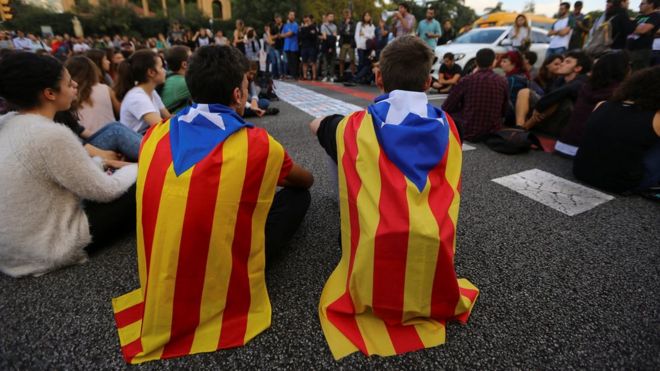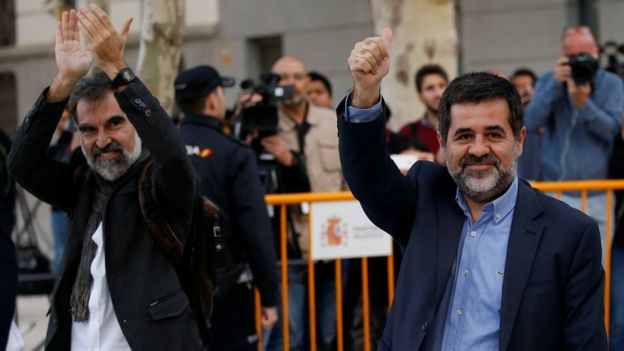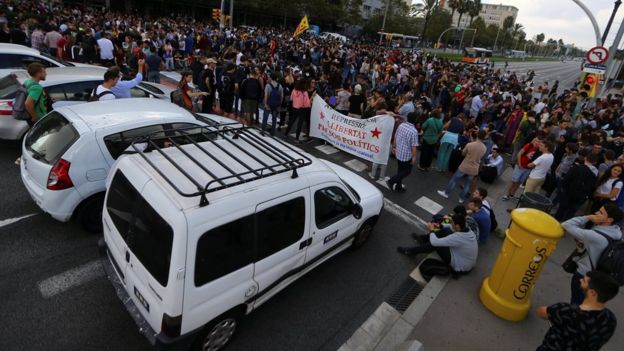 |
| People are angry with the High Court decision |
Crowds have gathered in Barcelona to protest against the jailing of two leaders of the Catalan separatist movement.
Jordi Sánchez and Jordi Cuixart are being held without bail while they are under investigation for sedition.
The men were leading figures in the disputed 1 October independence vote, which Madrid has branded illegal.
Spain's Constitutional Court appeared to back central government's position on Tuesday, ruling the vote void.
It had initially suspended the law used by Catalan authorities to call the referendum.
However, Catalan government spokesman Jordi Turull suggested neither the court decision nor the imprisonment of Mr Sánchez and Mr Cuixxart was going to stop the drive for independence, telling reporters "surrender is not something this government is considering".
Two Catalan separatists in Spanish custody
Spain says Catalonia leader Puigdemont 'unclear' on independence
Catalan leader Carles Puigdement has already signed a declaration of independence, but halted its implementation to allow negotiations as he called for talks to take place over the next two months.
The position still stands, Mr Turull said.
 |
| Jordi Cuixart (left) and Jordi Sánchez (right) faced a judge in Madrid on Monday |
But the Spanish government has warned that Catalonia must revoke the declaration or face direct rule from Madrid.
Mr Puigdemont has also angered Madrid by refusing to clarify whether or not he declared independence last week. He has until Thursday to clarify his position.
Catalan independence: A waiting game
By James Reynolds, BBC News, Barcelona
"I don't know what will happen," one pro-independence campaigner told me during a small demonstration at midday.
"Perhaps Spain will send in tanks," he said, only half-jokingly.
No-one here seriously expects that to happen. But many are unsure as to what comes next. Pro-independence groups have been angered by the Spanish High Court's decision to remand into custody two prominent campaigners, Jordi Sanchez and Jordi Cuixart.
"They are our first political prisoners," one man told me.
In the centre of Barcelona, normal life continues. Outside the Catalan regional government headquarters, groups of tourists find themselves sidestepping camera crews. Many residents in the city still display independence flags from their balconies.
All await Thursday morning's deadline.
In Barcelona, the imprisonment of Mr Sánchez, who heads the Catalan National Assembly (ANC), a pro-independence organisation, and Mr Cuixart, leader of Omnium Cultural, sent thousands of their supporters into the street, chanting "repression is not the solution".
The men are being investigated over a protest on 20 September in which a crowd blocked Civil Guard officers inside a building in Barcelona, Catalonia's regional capital.
Barcelona Mayor Ada Colau - who does not support the current bid for Catalan independence - said they were being held as "political prisoners".
Mr Puigdemont had also said the jailing of the men, known fondly as "the two Jordis", was like having "political prisoners again", a nod to the days when Catalan culture was systematically suppressed under Francsico Franco.
 |
| More protests are expected on Tuesday evening |
Spanish Justice Minister Rafael Catala dismissed the allegations, however, saying it was purely a judicial decision.
"These are not political prisoners because yesterday's prison ruling was due to a [suspected] crime," he said.
Further protests, which are expected to attract even larger crowds, are planned in Barcelona this evening.
Mr Cuixart instructs separatists to "never lose hope because the people of Catalonia have earned their future"
Just hours before the ruling, the High Court freed the head of Catalonia's police force, Josep Lluis Trapero.
His force, the Mossos d'Esquadra, is accused of failing to help Spain's Guardia Civil police tackle thousands of pro-independence protesters in Barcelona during the run-up to the referendum.
Prosecutors had called for him to be held in detention.
Source: BBCNews
